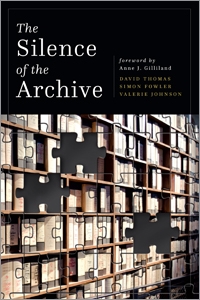
The Silence of the Archive
Customers outside of North America (USA and Canada) should contact Facet Publishing for purchasing information.
Primary tabs
You don't need to be an ALA Member to purchase from the ALA Store, but you'll be asked to create an online account/profile during checkout to proceed. This Web Account is for both Members and non-Members. Note that your ALA Member discount will be applied at the final step of the checkout process.
If you are Tax-Exempt, please verify that your account is currently set up as exempt before placing your order, as our new fulfillment center will need current documentation. Learn how to verify here.
- Description
- Table of Contents
- About the authors
- Reviews
This new book provides a groundbreaking discussion of a major but little considered issue: Why do archives, sometimes seen as the repositories of truth, often fail to satisfy users because they do not contain information which they expect to find?
Silences range from details of individuals’ lives to records of state oppression or of intelligence operations. The book brings together ideas from a wide range of fields, from contemporary history through family history research to Shakespearian studies. The authors describe why these silences exist, discuss their impact, and survey how researchers have responded to them in the digital age.
Marking the first time that the question of silence in the archives has been discussed holistically and from a broad perspective, this book examines the causes, responses, and implications both for researchers and for the archive itself. Key topics include:
- enforced silences;
- inappropriate selection;
- dealing with the silence;
- possible solutions; and
- the meaning of the silences.
PART I: REASONS FOR THE SILENCES
1. Enforced silences
2. Inappropriate selection
3. Inappropriate expectations
PART II: RESPONSES TO THE SILENCES
4. Dealing with the silence
5. Fictionalizing and worse
PART III: WHAT CAN BE DONE?
6. Possible solutions
7. The meaning of the silences
David Thomas
David Thomas is a Visiting Professor at the University of Northumbria where he is involved in research into access to contemporary records. Previously, he worked at the National Archives where he was Director of Technology and was responsible for digital preservation and for providing access to digital material. He has written articles and book chapters on archives, focusing on the implications of the digital.
Simon Fowler
Simon Fowler is an Associate Teaching Fellow at the University of Dundee where he teaches a course on military archives. Previously he worked at The National Archives for nearly thirty years. He has an MA in Archive Administration from University College London where his thesis was on income generation by archives.
Valerie Johnson
Valerie Johnson is Interim Director of Research and Collections at The National Archives. She holds an MA with Distinction in Archive Administration, and was awarded the Alexander R Myers Memorial Prize for Archive Administration. She has worked as an archivist and a historian in the academic, corporate and public sectors.
Anne J. Gilliland
Anne J. Gilliland, Associate Professor, Department of Information Studies, University of California, Los Angeles, conducts research and teaches in the areas of electronic records management, the design and evaluation of information systems containing primary sources, and archival education. She has an MA from Trinity College Dublin, an MS and CAS from the University of Illinois at Urbana-Champaign, and a Ph.D. from the University of Michigan. She is a Fellow of the Society of American Archivists, and a recipient of the Society’s C.F.W. Coker Award and the Midwest Archives Conference Margaret Cross Norton Award.
”Filled with thought-provoking and pertinent anecdotes (many of which are related to Great Britain), this is an interesting book for those who create, manage, and use archives."
— Booklist
”This work is highly recommended for various specialists in archival operations, including manuscript curators, records managers, digital archivists, and government-document specialists, as well as practicing and future historians."
— CHOICE
”The book covers many types of silences—or gaps—in the archival record, including how silences are created, how user expectations define and exacerbate them, and why silences are sometimes necessary ... Readers will step away with a heightened awareness that silences exist in archives and will hopefully be challenged to question and interrogate the silences in their own archives."
— New England Archivists Newsletter


